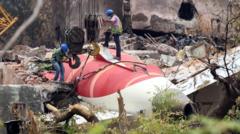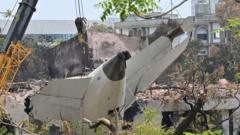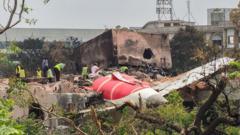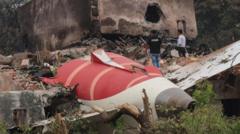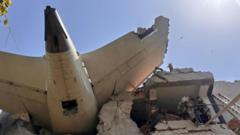The arrest of Mayor José Murguía Santiago underscores the ongoing fight against cartel violence and the quest for justice for missing persons in Mexico.
**Mayor of Teuchitlán Arrested Amid Cartel Training Camp Scandal**

**Mayor of Teuchitlán Arrested Amid Cartel Training Camp Scandal**
Authorities investigate ties between local officials and the Jalisco New Generation Cartel following disturbing discoveries at a training site.
Mexican authorities have apprehended the mayor of Teuchitlán, José Murguía Santiago, amid a deepening investigation into a cartel training camp linked to the New Generation Jalisco Cartel (CJNG). The arrest follows the unsettling discovery of bone fragments and numerous personal items—including shoes and backpacks—at the Izaguirre ranch, approximately 15 kilometers from Teuchitlán, which was allegedly used for sinister activities by the criminal organization.
The inquiry began in March when activists, searching for their disappeared relatives, stumbled upon evidence suggesting that the ranch may have served as a training facility where recruits were subjected to violence and coercion. The grave concerns of rights organizations indicate that many individuals who resisted indoctrination might have met a horrific fate.
Attorney-General Alejandro Gertz disclosed at a recent news briefing the findings of the investigation, acknowledging that the ranch operated as a recruitment center for the CJNG, regarded as one of the most powerful drug trafficking syndicates in Mexico. Despite this, he stated that there was insufficient evidence to classify the site as an extermination camp, which has sparked outrage among families of the missing and human rights advocates who demand transparency and accountability.
During the press conference, Gertz attempted to clarify the situation by asserting that the bone fragments discovered were not fresh and indicated that the fires ignited at the site were inadequate for the complete incineration of human remains. However, his comments raised more concerns than resolutions, particularly regarding the identity of the abandoned belongings and the fate of those connected to them.
The coalition of "searchers" — family members of many of the over 120,000 missing persons in Mexico — expressed dissatisfaction with the official response, emphasizing the need for thorough investigations to uncover the truth behind the atrocities allegedly committed at the ranch.
In response to the allegations, Mayor Murguía Santiago had previously voiced his willingness to cooperate with investigators, asserting his innocence and readiness to provide any necessary information. Nonetheless, prosecutors are now alleging his complicity, stating he was aware of the ranch's operations and failed to act on this knowledge.
As the investigation progresses, the focus intensifies on the intricate connections between local governance and powerful cartels, highlighting the ongoing struggle against cartel-related violence and the urgent need for justice for countless victims in Mexico.
The inquiry began in March when activists, searching for their disappeared relatives, stumbled upon evidence suggesting that the ranch may have served as a training facility where recruits were subjected to violence and coercion. The grave concerns of rights organizations indicate that many individuals who resisted indoctrination might have met a horrific fate.
Attorney-General Alejandro Gertz disclosed at a recent news briefing the findings of the investigation, acknowledging that the ranch operated as a recruitment center for the CJNG, regarded as one of the most powerful drug trafficking syndicates in Mexico. Despite this, he stated that there was insufficient evidence to classify the site as an extermination camp, which has sparked outrage among families of the missing and human rights advocates who demand transparency and accountability.
During the press conference, Gertz attempted to clarify the situation by asserting that the bone fragments discovered were not fresh and indicated that the fires ignited at the site were inadequate for the complete incineration of human remains. However, his comments raised more concerns than resolutions, particularly regarding the identity of the abandoned belongings and the fate of those connected to them.
The coalition of "searchers" — family members of many of the over 120,000 missing persons in Mexico — expressed dissatisfaction with the official response, emphasizing the need for thorough investigations to uncover the truth behind the atrocities allegedly committed at the ranch.
In response to the allegations, Mayor Murguía Santiago had previously voiced his willingness to cooperate with investigators, asserting his innocence and readiness to provide any necessary information. Nonetheless, prosecutors are now alleging his complicity, stating he was aware of the ranch's operations and failed to act on this knowledge.
As the investigation progresses, the focus intensifies on the intricate connections between local governance and powerful cartels, highlighting the ongoing struggle against cartel-related violence and the urgent need for justice for countless victims in Mexico.

